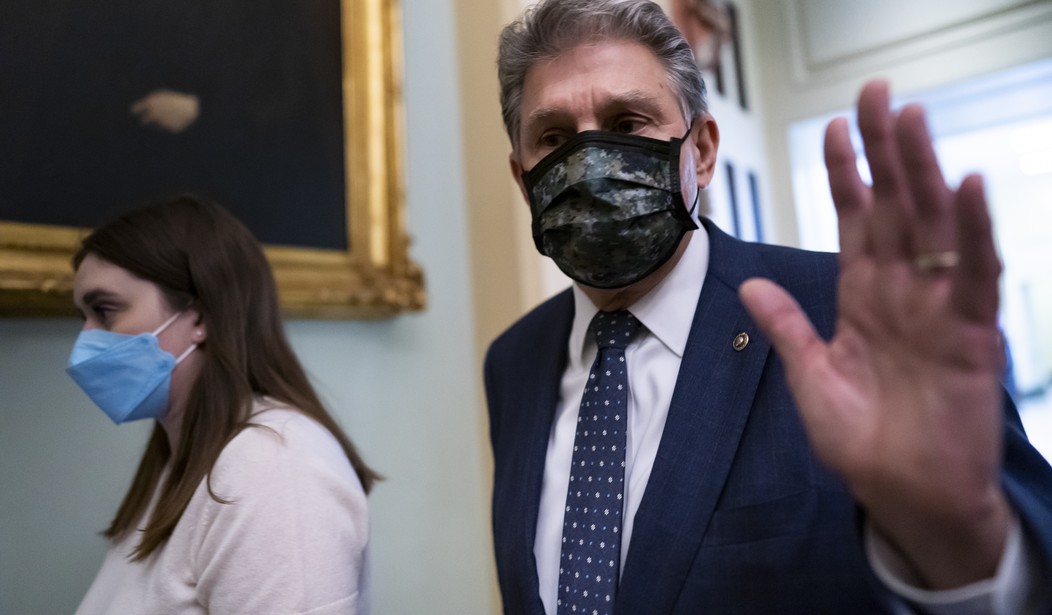It sounds as if King Joseph is a man being tugged in two different directions simultaneously. Some of Joe Manchin’s colleagues are pushing President Biden to give him another call and see if they can trim down the BBB to the point where he could vote for it. But at the same time, others are trying to tempt the West Virginia senator closer to agreeing to ditch the filibuster. Manchin is still insisting that he’s not interested in that, but the Democrats may have driven enough of a wedge under the door to be able to see a glimmer of light on the other side. Manchin’s latest pitch is that he’s not willing to kill the filibuster entirely, but he might be open to some smaller changes to the rules that could allow for some progress to be made. (The Hill)
Sen. Joe Manchin (D-W.Va.) on Tuesday night floated smaller changes to the Senate rules that would stop short of the filibuster reforms being pushed for by many of his Democratic colleagues.
Manchin, coming out of a meeting with Majority Leader Charles Schumer (D-N.Y.) and other Democrats involved in the negotiations, didn’t pledge to vote for any specific rules reforms but appeared open to smaller changes.
“I think the filibuster needs to stay in place, any way shape or form that we can do it,” Manchin said, asked about keeping the current rule that requires most legislation to get 60 votes to advance through the Senate.
The “smaller” rule changes that Manchin is now talking about range from the barely significant to ones that would cripple the filibuster without officially burying it. For an example of the former, he’s suggesting that some Republicans might go along with a plan to eliminate the 60 vote threshold for starting debate on a bill. That would stop the minority from completely shutting down the idea of a bill before it’s even been discussed, but so long as the filibuster was in effect for ending debate, nothing much would change. That is unless another of the options he’s talking about also goes into effect. We’ll circle back to that in a moment, as Jen Psaki likes to say.
His second proposal would “put power back in the hands of the committees.” Under this idea, any bill that came out of committee with a significant amount of bipartisan support could be flagged for a quick up or down vote. That might sound like it would end the filibuster in some cases, but if, for example, a Democrat-sponsored bill received a significant number of votes in committee from Republicans, it would likely pass on the floor anyway. All this would really do is prevent one or two minority members from filibustering it on the floor. This is another change that might not be all that bad but probably wouldn’t create any significant changes in the outcome for most legislation currently under consideration.
Another option Manchin is willing to consider is the “talking filibuster.” That would allow members to block a final vote for as long as they can hold the floor, but once they finished, the bill would go to a straight up-or-down vote. This is the one I referenced above. Anyone would be hard-pressed to hold the floor indefinitely, so if a bill can be brought to the floor for debate with a simple majority, it’s likely going to eventually pass the same way even if there is a lengthy delay.
The one wildcard option on the table is a proposal to change the filibuster from requiring 60 votes to end the debate to require the support of three-fifths of senators present and voting. That’s a fairly minor change unless there are a lot of members absent during a critical vote. But, at least in theory, it could have a significant impact if there were as few as six to eight Senators absent for a vote.
The only other suggestion is the recent fad of keeping the filibuster but allowing for temporary changes to the rules suspending it for one piece of legislation or another. As far as I’m concerned, that’s the same as eliminating the filibuster entirely. Making that change means that we only have the filibuster in play when it’s convenient for the majority to do so. Any Republican who agrees to that idea is simply committing career suicide.
Not to be too much of a cynic here, but it’s hard to take much of this talk about altering the actual debate of pending legislation very seriously. It was probably more open to surprises a couple of generations ago, but when was the last time that even an extended debate on the floor changed the mind of even one senator and saw them switch sides? We’re no longer living in the age of Mr. Smith Goes to Washington. The parties are so divided at this point (with a few, occasional exceptions) that any seriously contentious bills break down along party lines and no amount of impassioned speeches will suddenly swing a bunch of votes in the other direction. The Senate is just as divided along partisan lines as the House is, with the occasional exception of some “mavericks” who decide to buck the system because they’re probably going to retire anyway.








Join the conversation as a VIP Member